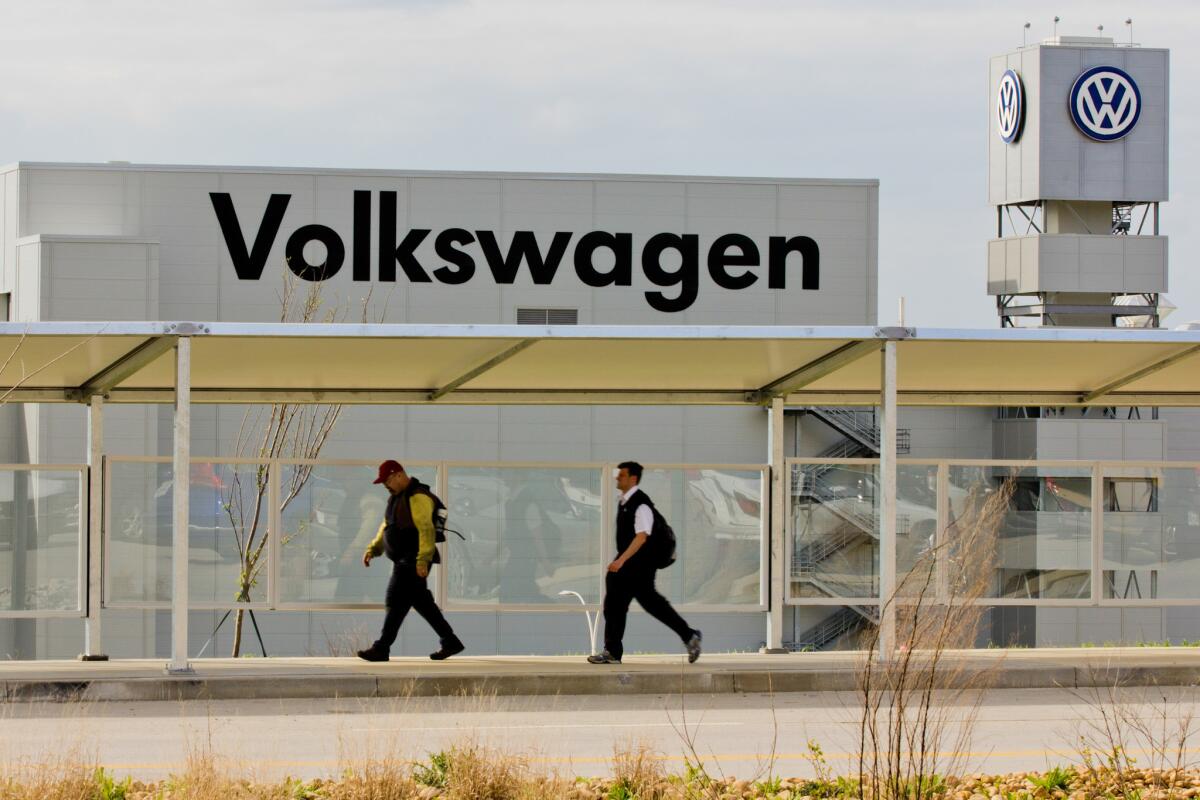Will VW’s Tennessee workers say yes to the UAW? Let’s hope so.

- Share via
Thursday is the second of three days of a union-organizing vote at Volkswagen’s Tennessee auto assembly plant, and it’s being tracked like a congressional special election. Is it a bellwether for the state of modern labor? Or is it a one-off that says nothing of significance beyond the confines of the VW factory floor?
It’s a bit of both. The vote has attracted an extraordinary amount of outside interest and pressure, including misleading public billboards, bizarre claims on local talk-radio stations and a general frothing from the anti-union right that worker-management cooperation is the first step toward Stalinism. The organizing vote also seems to have brought out the worst in some Republican state politicians, who have threatened future financial help for VW projects if the United Auto Workers wins the election. As my colleague Jon Healey wrote Wednesday, that is an inappropriate threat.
But I go further: The politicians are wrong to oppose this (especially those who usually condemn government meddling in private business; why are they meddling now?). As is the Grover Norquist-led Americans for Tax Reform, which has been spending heavily to try to persuade the VW workers to remain unorganized (it’s mystifying what a private labor agreement has to do with tax reform).
VW has a history of using worker-management committees to help run its factories, resolve disputes and keep everyone involved in making its cars vested and happy. Similar labor-management committees cropped up in the U.S. in the 1970s and ’80s. Under U.S. laws barring company-directed unions, if VW wants to establish a worker committee like the ones in Germany, the workers must first be represented by an independent union. VW has said fine, if that’s the law and what its employees want, welcome to Chattanooga, UAW.
This is between VW and its workers, but the fear of a reinvigorated labor movement clearly has goaded the anti-labor right into action, which makes this an important election. If, against this headwind of propaganda and political opposition in a state with anti-union “right-to-work” laws, the UAW can win an organizing battle, maybe we’re seeing a turning of the tide.
It’s probably quixotic, but I’m hoping for a union win and fresh energy in the labor movement. (Full disclosure: I once spent 18 months on a picket line in Detroit in the 1990s, supported in part by UAW members). We often hear comments that the good-paying blue-collar union jobs of the past are gone forever, and they probably are. But it’s not as if they evaporated into thin air; the work is being done, just in other countries. Federal labor and trade policies enabled that collapse. Steel is still being made, but not as much of it is being made here. That industry followed the off-shoring of the textile and shoe industries (which notably moved from labor-friendly Northeastern states to the anti-union South before going to lower-wage foreign factories). These days, it’s call centers, technical assistance and research work that is moving to cheaper labor markets.
Unions didn’t kill those industries, and by extension the American middle class. This is the result of Washington’s near-religious embrace of global free markets, and it’s a shared faith among Republicans and Democrats, even those who win elections with union backing. Remember Bill Clinton’s Democratic Leadership Council? That helped bring about NAFTA, and marked a shift by both major parties to a political focus on corporate profits, not the quality of life for American workers or the health and stability of our communities. Organized labor needs to regain its organizational footing and rethink its political engagements, particularly on the national level.
In Tennessee, the issue is whether VW workers will adopt the UAW as their bargaining agent, a specter that outside agitators say will lead Chattanooga down a long slope to a Detroit-style collapse. There’s even a billboard with a photo of a battered Detroit street. But that too is a chimera. As I’ve written before, Detroit’s collapse was the result of decades of federal and corporate policies (including sticking with gas-guzzling cars when the public turned its back on them), the intentional de-industrialization of the city, endemic regional racism, a lack of political vision and will, and the crumbling of public institutions as the tax base walked away. The UAW might be powerful, but it’s not powerful enough to do all that.
There’s no doubt that unions have their share of problems and issues, including a lack of flexibility and occasional lack of accountability to their members. But most institutions grapple with these problems. Still, unions were largely responsible for the rise of the American middle class, for job safety measures, for the eight-hour day and 40-hour workweek (which has been eroded in recent years), and a long list of other benefits that modern workers — including anti-union folks — take for granted. And they remain the best mechanism we have for establishing and defending rights in the workplace, even with hostile public opinion engendered by corporate America (and the occasional public relations misstep), as well as weakened legal protections for organizing.
Will the vote this week turn that tide? Likely not, but one can hope. At the very least, I look forward to the day when I’ll be able to buy a VW with a union label on it. And I hope that day comes soon.
ALSO:
Don’t give up on the bullet train, California
The best way to replace San Onofre’s power
Follow Scott Martelle on Twitter @smartelle
More to Read
A cure for the common opinion
Get thought-provoking perspectives with our weekly newsletter.
You may occasionally receive promotional content from the Los Angeles Times.











